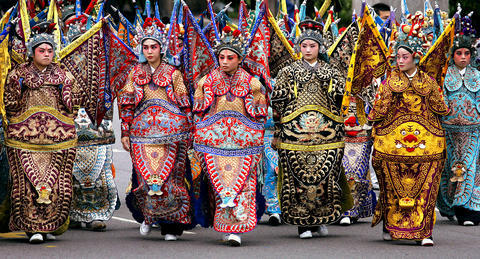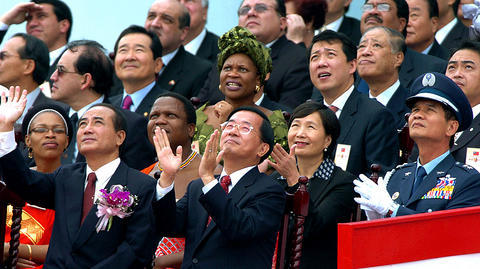President Chen Shui-bian (
Mentioning the country's official name -- the Republic of China (ROC) -- only once in his speech, Chen shouted "Viva democracy, Taiwan jiayou [
With placards reading "Taiwan's entry into the UN" on the facade of the Presidential Office, this year was the first time the building had not been decorated with placards displaying the nation's official name.

PHOTO: WALLY SANTANA, AP
Chen said the decorations were different from that of previous years because the administration wanted to reflect its resolve to push for the nation's UN membership bid using the name "Taiwan."
Taiwan is an independent nation that belongs to the 23 million Taiwanese, Chen said, adding that only Taiwanese have final say on the country's future.
"This is a historical fact. The `status quo' in the Taiwan Strait is that Taiwan and the People's Republic of China [PRC] are two different nations," he said.

PHOTO: SAM YEH, AFP
"China cannot represent the 23 million people of Taiwan and Taiwanese have the absolute right to request appropriate representation at the United Nations," he said.
To "return" to the international body using the name ROC -- as the Chinese Nationalist Party (KMT) has proposed -- not only challenges UN Resolution 2758 but would also plunge Taiwan into a more isolated and dangerous situation, Chen said.
With the Democratic Progressive Party (DPP) in the second phase of a petition to validate its referendum proposal seeking UN membership, Chen said he hoped the referendum could be held alongside the presidential election on March 22.
Chen also called on the legislature to pass amendments to the Referendum Law (
While the international community has expressed concern over the bloody crackdown on pro-democracy activists in Myanmar, Chen said equal attention should be paid to China's notorious human rights records and its persecution of freedom of speech, press and religious freedom.
Chen called on the international community to pressure Beijing into dismantling the missiles targeted at Taiwan, stopping military drills simulating attacks on Taiwan, abolishing its "Anti-Secession" Law and speeding up political and democratic reforms.
"We believe that only through China's democratic awakening can there be sustainable peace in the world," he said.
Chen said he had extended several olive branches to Beijing but that his efforts had only been met with more suppression. He nevertheless vowed to maintain a "firm position, pragmatic advancement" and to continue seeking normalization of cross-strait relations.
Calling the "cross-strait common market" proposed by KMT vice presidential candidate Vincent Siew (蕭萬長) a "one China market," Chen said it was bound to lead to China's economic annexation of Taiwan.
Chen also cited statistics to dismiss opposition claims that Taiwan's economy is doing worse than South Korea's, saying that Taiwan was still one of Asia's four tigers.
"For those who have Taiwan on their mind, Taiwan will always be prominent," he said.
Meanwhile, Legislative Speaker Wang Jin-pyng (王金平) confirmed that he had requested that military policemen deployed at the National Day celebration remove flyers detailing the government's UN bid from guest seats before the celebrations.
Asked for comment, Wang, who organized the event, said he made an "emergency decision" immediately after being informed of the flyers yesterday morning.
"The military police were there to maintain order. How could they distribute unrelated flyers?" Wang said.
The basic guidelines stated that bulky backpacks, weapons, megaphones, balloons, signs, flyers or flags unrelated to the celebrations would not be allowed at the scene.
Wang said he had requested that these guidelines be respected to the letter.
Additional reporting by Flora Wang

FALSE DOCUMENTS? Actor William Liao said he was ‘voluntarily cooperating’ with police after a suspect was accused of helping to produce false medical certificates Police yesterday questioned at least six entertainers amid allegations of evasion of compulsory military service, with Lee Chuan (李銓), a member of boy band Choc7 (超克7), and actor Daniel Chen (陳大天) among those summoned. The New Taipei City District Prosecutors’ Office in January launched an investigation into a group that was allegedly helping men dodge compulsory military service using falsified medical documents. Actor Darren Wang (王大陸) has been accused of being one of the group’s clients. As the investigation expanded, investigators at New Taipei City’s Yonghe Precinct said that other entertainers commissioned the group to obtain false documents. The main suspect, a man surnamed

DEMOGRAPHICS: Robotics is the most promising answer to looming labor woes, the long-term care system and national contingency response, an official said Taiwan is to launch a five-year plan to boost the robotics industry in a bid to address labor shortages stemming from a declining and aging population, the Executive Yuan said yesterday. The government approved the initiative, dubbed the Smart Robotics Industry Promotion Plan, via executive order, senior officials told a post-Cabinet meeting news conference in Taipei. Taiwan’s population decline would strain the economy and the nation’s ability to care for vulnerable and elderly people, said Peter Hong (洪樂文), who heads the National Science and Technology Council’s (NSTC) Department of Engineering and Technologies. Projections show that the proportion of Taiwanese 65 or older would

Democracies must remain united in the face of a shifting geopolitical landscape, former president Tsai Ing-wen (蔡英文) told the Copenhagen Democracy Summit on Tuesday, while emphasizing the importance of Taiwan’s security to the world. “Taiwan’s security is essential to regional stability and to defending democratic values amid mounting authoritarianism,” Tsai said at the annual forum in the Danish capital. Noting a “new geopolitical landscape” in which global trade and security face “uncertainty and unpredictability,” Tsai said that democracies must remain united and be more committed to building up resilience together in the face of challenges. Resilience “allows us to absorb shocks, adapt under

Taiwan Semiconductor Manufacturing Co (TSMC, 台積電) yesterday said it is building nine new advanced wafer manufacturing and packaging factories this year, accelerating its expansion amid strong demand for high-performance computing (HPC) and artificial intelligence (AI) applications. The chipmaker built on average five factories per year from 2021 to last year and three from 2017 to 2020, TSMC vice president of advanced technology and mask engineering T.S. Chang (張宗生) said at the company’s annual technology symposium in Hsinchu City. “We are quickening our pace even faster in 2025. We plan to build nine new factories, including eight wafer fabrication plants and one advanced